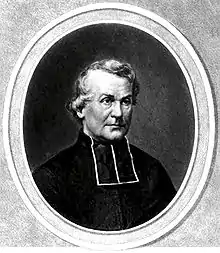Auguste Joseph Alphonse Gratry
Auguste Joseph Alphonse Gratry (usually known as Joseph Gratry; 10 March 1805 − 6 February 1872) was a French author and theologian.

Life
Gratry was born at Lille and educated at the École Polytechnique of Paris. After a period of mental struggle which he has described in Souvenirs de ma jeunesse, he was ordained priest in Strasbourg 1832. After a stay at Strasbourg as professor of the Petit Séminaire, he was appointed director of the Collège Stanislas in Paris in 1842 and, in 1847, chaplain of the École Normale Supérieure.[1] He was awarded the Order of the Legion of Honor in 1845.
In 1852 he and Abbé Pierre Pététot revived Bérulle's Congregation of the Oratory. Gratry was a brilliant academic, holding doctorates in both the humanities and theology. He envisioned communities which could be schools of theological exploration, working with the scientific focus of modern society.[2]
He became vicar-general for the bishop of Orleans in 1861, professor of moral theology at the Sorbonne in 1863, and, on the death of Barante, a member of the Académie française in 1867, where he occupied the seat formerly held by Voltaire.[1]
Together with Abbé Philippe Pététot, pastor of Saint Roch, and Hyacinthe de Valroger, Joseph Gratry reconstituted the French Oratory, a society of priests mainly dedicated to education. Gratry was one of the principal opponents of the definition of the dogma of papal infallibility, but in this matter he submitted to the declarations of the First Vatican Council.[1]
Death
Gratry developed throat cancer at the end of his life and went to Montreux, Switzerland, for treatment, where he died. He was buried in Montparnasse Cemetery in Paris by his sister.
Works
- De la connaissance de Dieu, (The Knowledge of God) opposing Positivism (1855)
- La Logique (1856)
- Les Sources, conseils pour la conduite de l'esprit (1861−1862)
- La Philosophie du credo (1861)
- Commentaire sur l'évangile de Saint Matthieu (1863)
- Jésus-Christ: réponse à M. Renan (1864)
- Les Sophistes et la critique (in controversy with E. Vacherot) (1864)
- La Morale et la loi de l'histoire, (Morality and the law of History), (1868)
- Mgr. l'évêque d'Orléans et Mgr. l'archevêque de Malines (1869), containing a clear exposition of the historical arguments against the doctrine of papal infallibility.[1]
References
-
 One or more of the preceding sentences incorporates text from a publication now in the public domain: Chisholm, Hugh, ed. (1911). "Gratry, Auguste Joseph Alphonse". Encyclopædia Britannica. 12 (11th ed.). Cambridge University Press. p. 379.
One or more of the preceding sentences incorporates text from a publication now in the public domain: Chisholm, Hugh, ed. (1911). "Gratry, Auguste Joseph Alphonse". Encyclopædia Britannica. 12 (11th ed.). Cambridge University Press. p. 379. - "L'histoire de l'Oratoire". L'Oratoire de France (in French). Archived from the original on 2013-10-22.
Sources
- Marias, Julian. La filosofia del Padre Gratry; 2nd ed. Buenos Aires: Editorial Sudamericana, 1948 (in Spanish)
Further reading
- Chauvin, Amédée (1911) Le père Gratry, 1805-1872: l'homme et l'oeuvre d'apres des documents inedits; Nouv. éd., rev. et augm. Paris: Bloud. (1st ed. 1901)
External links
- George M. Sauvage (1913). . In Herbermann, Charles (ed.). Catholic Encyclopedia. New York: Robert Appleton Company.
- El sentido de lo infinito en Gratry by Máximo Lameiro.
